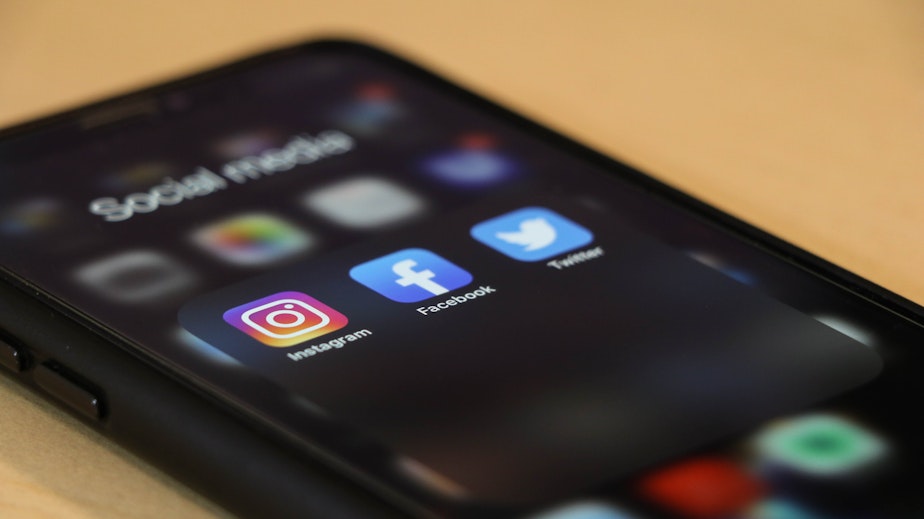Can you believe it? (You probably will): Today So Far

- Social media is filled with mis/disinformation, and our brains are wired to believe it.
- And how often do you SIFT? Try this method to weed out bad online info.
- How did KUOW fact check a story?
This post originally appeared in KUOW's Today So Far newsletter for March 17, 2022.
A video of Ukrainian President Volodymyr Zelenskyy has spread far on social media. In it, the president tells Ukrainian forces to lay their guns down and surrender to Russia. It must be true, right? It's a video, and it's on social media.
It's not true. The video is a deepfake — a well-crafted manipulation of video to make it appear real. It's one form of disinformation (media crafted with the intention to deceive). There is also misinformation (just plain inaccurate info). Social media is filled with it and, unfortunately, our brains are inclined to believe it.
"One of the big reasons people fall for misinformation is that we don't always question whether information is true," Maddy Jalbert told KUOW.
Jalbert is with the University of Washington's Center for an Informed Public, which largely deals with this topic. The first step in solving a problem is admitting you have one. And we all have this problem.
"As individuals, we have a tendency to believe that others can be biased, but we ourselves are not. But in fact, all of us are susceptible to misinformation. This is really just a byproduct of the way our brains work."
Sponsored
I, Dyer Oxley, a journalist who works in the field of online media, have learned this the hard way. I have shared a quote that was misleading. And I have interacted with a tweet that was later found to be the product of Russian trolls. If it can happen to me, it can happen to you.
How many tweets or Facebook posts have you shared, or commented on, when you only read the headline?
And how often do you SIFT?
Stop. Investigate the source. Find better coverage. Trace claims, quotes, and media to the original context.
It's advice that is becoming more important as we watch developments in Ukraine, as UW's Mike Caufield told Soundside.
Sponsored
"It's a series of events taking place in a foreign country. There are language differences, there are sort of complex political dynamics that the average viewer or reader may not be aware of. And then of course, you know, there's just the nature of war, propaganda."
Finally, a TSF reader wrote me about KUOW's recent story about a Bainbridge Island businessman's efforts to help people in Ukraine. The reader asked: "What verification is done before stories like this are published to make sure they are legitimate charities?"
I love this question. Not only for reporting, but also because this is the sort of fact-checking we can all do.
In a nutshell, John O'Brien produced this segment. He tells me this story about Aid For Ukraine was pitched by a person close to the charity, to a KUOW colleague, after it had also been reported elsewhere. So there was a personal connection made, and some conversations that happened before this source was put on air. But just because someone else reports it, and because a personal connection has been made, that doesn't mean you shouldn't check your facts and verify.
In this case, the charity is very upfront and transparent. They are run under the 501(c)(3) Foundation for Equity and Justice LTD. This foundation is registered in Idaho. A quick search through Idaho's Secretary of State database shows that this organization is indeed genuine and is in "active - good standing."
Sponsored
In Washington, our Secretary of State has set up a pretty amazing database of businesses and charities that you can search through. And Washington goes a step further with its ongoing Give Smart campaign that helps you weed through risky organizations (some charities sell their donor lists, for example). You might also have luck with the Better Business Bureau, which keeps its own database of charities, and reviews and ranks them.
AS SEEN ON KUOW

Interactive road trip planner at the Negro Motorist Green Book exhibit at the Washington State Historical Society in Tacoma. The exhibit runs through June 12. (Courtesy of Candacy Taylor)
DID YOU KNOW
Happy St. Patrick's Day! If you're in the Northwest, you're in a great area to celebrate the holiday, according to the number crunchers at WalletHub. They considered the largest 200 cities in the U.S. and measured them up against a few factors — parades, pubs per capita, price of beer, Irish population, etc. This year, they even included the percentage of fully vaccinated locals. The result is the list of best cities to celebrate St. Patrick's Day.
Seattle doesn't make the top of the list, sadly, at 23rd. Boise beats us at 18th. Portland comes in at 72nd. And Spokane at 94th. Bellevue sneaks in at 200.
Though when you break down certain factors, it gets interesting. Spokane comes in second in the nation when it comes to its share of Irish residents. Seattle is third when it comes to pubs per capita. However, WalletHub also considered average weather on the holiday. Rounding up the absolute worst cities on that list — Seattle, Bellevue, Tacoma, Portland, Vancouver.
ALSO ON OUR MINDS

Netflix plans to start charging for password sharing, and customers aren't happy
Netflix announced Wednesday it plans to start cracking down on password sharing among watchers, and customers are not taking it well (and it makes TSF writer Dyer Oxley very nervous).

